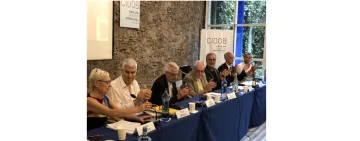Policy coherence, a key tool for effectively achieving the SDGs

CIDOB and the General Directorate for Development Cooperation organised a conference to analyse the incorporation of PCD into public policies through practical cases.
CIDOB and the General Directorate for Development Cooperation at the Department of Foreign Action, Institutional Relations and Transparency of the Catalan Government organised the seminar “Policy coherence to face the new development challenges”, hold at CIDOB’s headquarters on the 28th of June 2018. The aim of this seminar was to analyse the state-of-the-art of Policy Coherence for Development (PCD) effective translation into public policies by contrasting practical cases from European countries that have been pioneers in the incorporation of PCD and debating with experts who have worked on its theorisation and/or evaluation. The objective was to stimulate the political will of decision makers in Catalonia to effectively incorporate PCD into public policies, to improve the knowledge about the challenges involved, to identify key regulatory and institutional instruments and to stimulate public debate involving different public and private actors.
The importance of PCD in the design of public policies and international cooperation practice increased in the last decade when it became a core part of both the Addis Ababa Agenda for Action and the 2030 UN Agenda for Sustainable Development. The latter sets out the Sustainable Development Goals (SDGs) and specifically mentions the PCD in the SDG17 to revitalize the global partnership. Therefore, it is now a challenge and an obligation of the institutions committed to the 2030 Agenda to incorporate this principle in a way that contributes to effectively achieving the commitments undertaken.
The seminar was attended by speakers from institutions such as the EU and the OECD and representatives of the governments of Belgium, Scotland, Spain, France and the Basque Country who presented the state of PCD in their respective countries/institutions. Subsequently, in the three thematic roundtables, these officials, together with other experts and representatives of civil society, analysed three aspects identified by the OECD's Development Assistance Committee (DAC) as essential for the effective incorporation of PCD into public policies: firstly, the diagnostic exercises and legislative instruments developed by the different actors; secondly, the policies implemented and the institutional mechanisms to guarantee their implementation; and thirdly, the mechanisms for monitoring, evaluation and accountability.
During the debate, experts agreed that political commitment at the highest governmental level is essential to ensure the effective implementation of PCD and that political will must be shared with political and social forces. However, it was also concluded that this is not an easy task because of the need to address the potential contradictions between many objectives and, at the same time, the need to balance the interests of very different actors. Therefore, efforts should be made to involve as many actors as possible in the process of policy making and priority setting.
Political commitment is a premise, but it is not enough; there are technical aspects that need to be incorporated to make good diagnoses, efficient planning, effective monitoring and good implementation, as well as to develop an evaluation system that allows learning from practice. Therefore, methodologies must be developed, an institutional apparatus must be created and human capacity must be built. Catalan institutions have a legal obligation to effectively implement CPD deriving from the Catalan Development Cooperation Law of 2001 and political guidelines that have been described in the Development Cooperation Plan, which is currently being updated. Now it is time to incorporate good practice and to turn PCD into an effective tool for the Catalan Government and institutions in order to contribute to the achievement of the 2030 Agenda goals.
During the conference closure, the Catalan Minister of Foreign Affairs, Ernest Maragall, highlighted the commitment of the Catalan Government to implementing policy coherence and the importance of the seminar conclusions for the definition of the new Development Cooperation Plan.
Presentations: